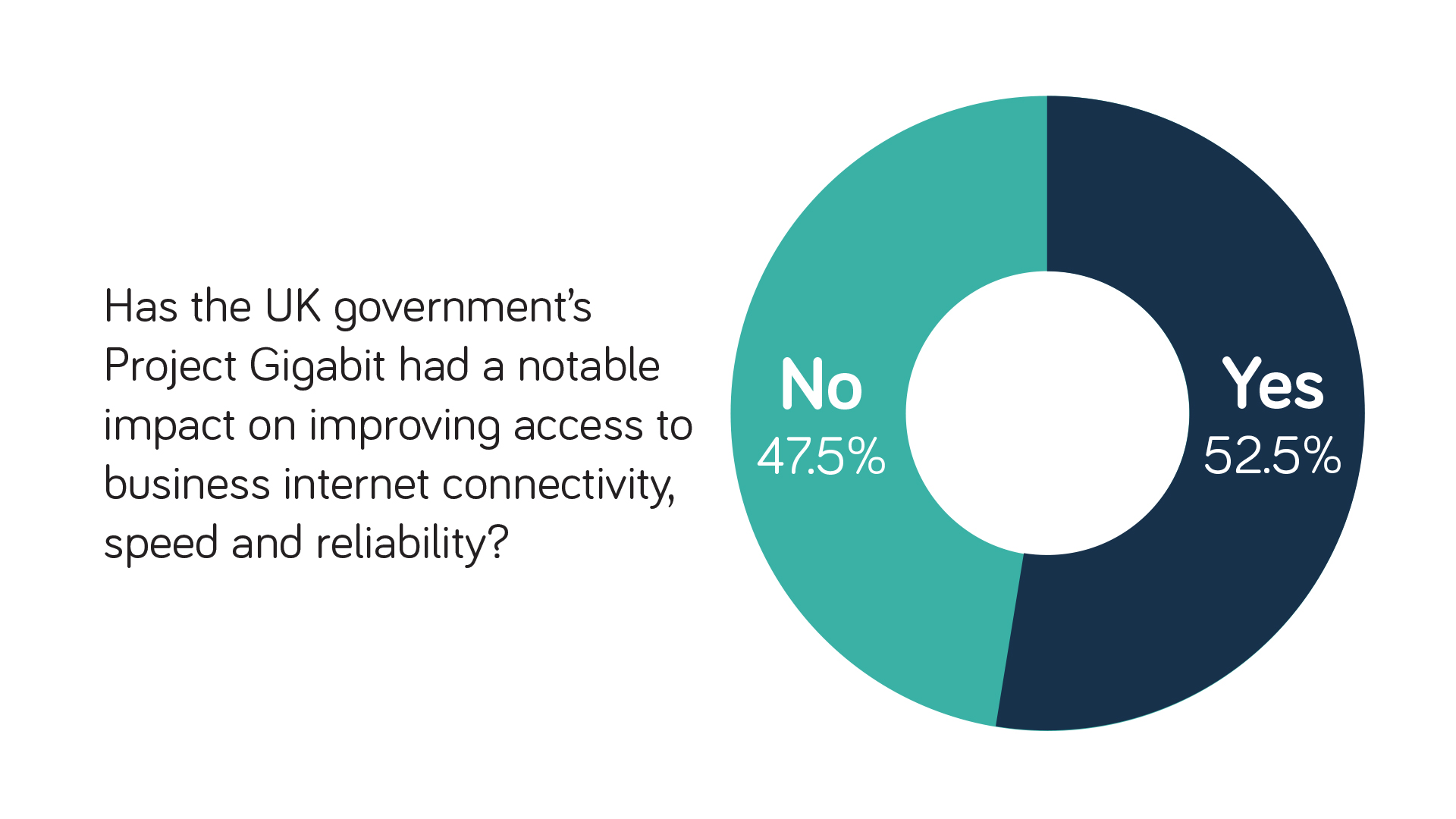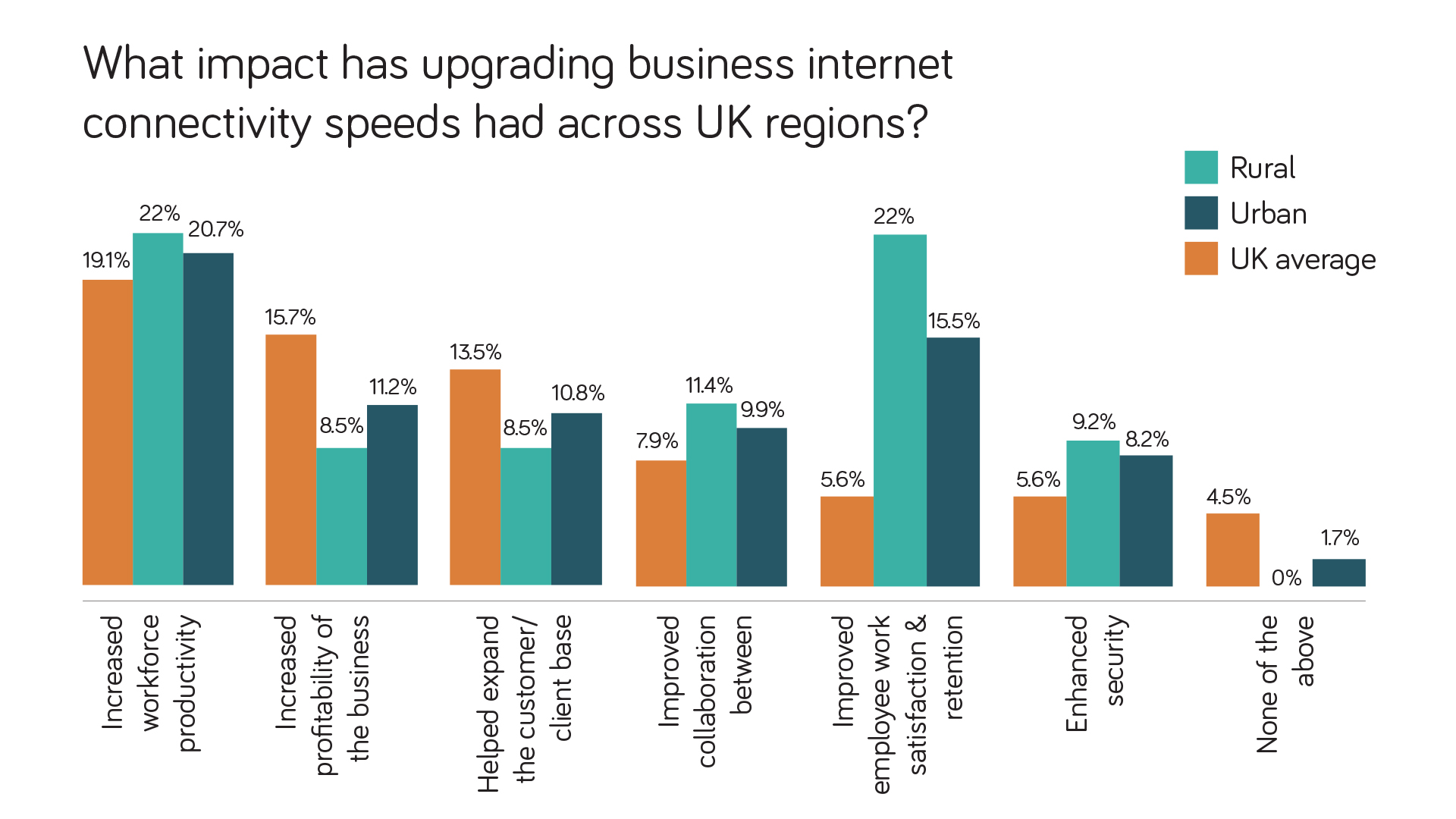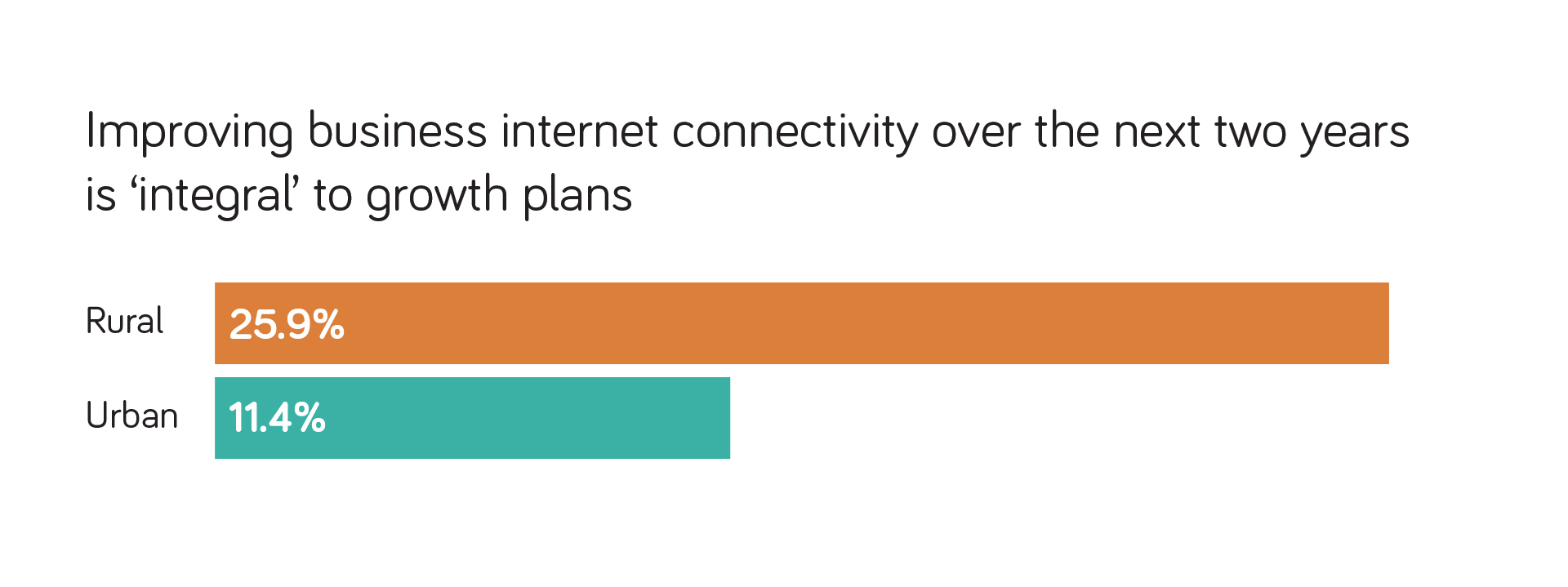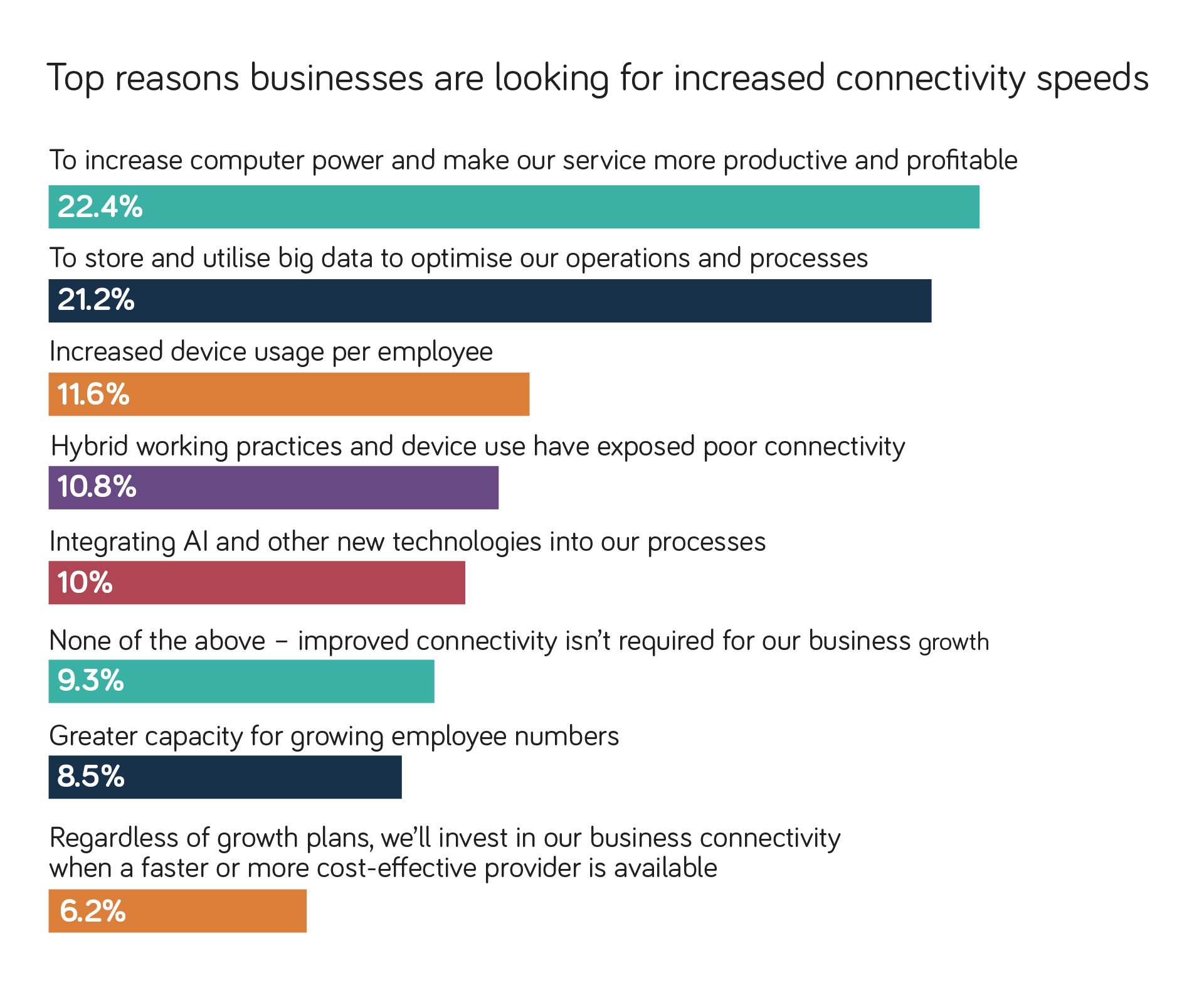- Home
- Resources
- Blog
- Home
- Business General
- The UK business gigabit connectivity report: could AltNets be the catalyst UK business needs?
The UK business gigabit connectivity report: could AltNets be the catalyst UK business needs?
As UK businesses look to invest in digital transformation, alternative network providers (AltNets) have an excellent opportunity to provide high-capacity connectivity to businesses nationwide. An analysis by Neos Networks.
- Neos Networks
- Business General ,

All signs point towards businesses continuing their recent digital expansion and diversifying the ways they use technology. In a 2024 Leadership Priorities in Tech survey of over 800 executives across the UK and US, 75% of leaders say digital transformation investment is needed in the next year.
To provide digital operations with the data and bandwidth they require, organisations are becoming increasingly reliant on higher capacity connectivity – speeds of 1Gbps and above.
While this level of connectivity hasn’t always been equally available to all UK businesses, AltNets have played a crucial role in expanding the reach of high-capacity connectivity – alongside the UK government’s Project Gigabit, first announced in March 2021.
In the most recent update (February 2023), the project announced that 73% of the UK was now gigabit capable. The project’s target is ‘85% gigabit capable connectivity by the end of 2025’. So, what more is needed to help AltNets and other service providers achieve these targets, and what's the appetite for businesses investing in improved connectivity?
Two years on from the rollout of Project Gigabit, we investigate:
- What impact has Project Gigabit had on UK business connectivity so far?
- Where do businesses see the greatest impact from connectivity investment?
- How AltNets can capitalise on connectivity-dependent growth
- Why high-capacity connectivity is being prioritised by UK businesses aiming to grow
- Is Project Gigabit achieving its ambition to ‘level-up rural and remote communities’?
- How network service providers like Neos Networks can help AltNets deliver improved connectivity
Methodology
We surveyed business leaders and decision-makers from 160 UK companies operating in a wide range of industry sectors. We were interested in the business appetite for connectivity investment to support growth; whether businesses had experienced greater connectivity since the Project Gigabit rollout; if further incentives are needed for Project Gigabit to achieve its levelling up goals and what part AltNets can play in this.
Key report findings:
- Project Gigabit claims to have reached the majority of UK businesses. Yet, when business leaders were asked if their business had felt a notable impact since the Project Gigabit rollout, just 52.5% said yes.
- There is a strong appetite for investment in the UK, with 42% of UK businesses viewing higher capacity connectivity in the next two years as key to their growth plans.
- For those that have upgraded since the start of Project Gigabit, nearly one in eight businesses (11.2%) stated that investing in connectivity had a direct impact on increasing business profitability.
- Of these, 98.3% of businesses said they saw positive indirect impacts such as improved productivity, staff retention or client collaboration.
- Imbalance remains between urban and rural areas. For every 10 urban businesses that said they’ve seen a positive impact from Project Gigabit, just six rural businesses reported that they had felt the same impact.
- One in five UK companies still aren’t receiving sufficient business internet speeds to facilitate smooth everyday operations.
- Over half (55.6%) of UK companies have risked losing a client or customer as a consequence of poor internet connectivity, speed or reliability.
What impact has Project Gigabit had on UK business connectivity so far?
A little over two years into Project Gigabit, and the rollout has had a fair reach across the UK. Yet when business leaders were asked if they’d felt a notable impact from Project Gigabit, only a little over half (52.5%) said yes.
It’s evident from this that there is still room for improvement and greater business engagement.

How does a connectivity shortfall impact business operations?
While 47.5% of businesses are yet to experience connectivity improvements from Project Gigabit, how many of these could be categorised as ‘priority improvement’ businesses, where connectivity issues are hampering daily business operations?
AltNet providers have a great opportunity to gain substantial market share by meeting business needs.
Worryingly, one in every five UK businesses is not receiving sufficient business internet speeds to conduct seamless everyday operations.
Worse still, bottom lines at more than half of the UK’s businesses have been affected with 55.6% having risked losing a client or customer due to poor internet connectivity, speed or reliability.
Understandably, these are the businesses most likely to be exploring connectivity options to improve daily operations. With almost half of UK companies in this position, AltNet providers have a great opportunity to gain substantial market share by meeting these needs.
Where do businesses see the greatest impact from connectivity investment?
For those organisations who have invested in improved connectivity over the last 24 months, how have their operations been impacted? And does this differ according to geographical location?
Nearly one in eight businesses (11.2%) stated that investing in connectivity had a direct impact on increasing business profitability.
And almost every company surveyed (98.3%) experienced positive indirect impacts, including improved productivity, staff retention or client collaboration. This highlights the power improved connectivity and capacities can have if targeted correctly, with the potential for greater efficiency as well as greater profitability.

How AltNets can capitalise on connectivity-dependent growth
To make the business case for AltNet investment, providing businesses in target areas with high-capacity fibre connectivity needs to be commercially viable.
Current challenges
The 100+ UK AltNets currently operating have been building out rapidly in favourable market conditions, demonstrating success by greatly improving ‘homes passed’ numbers. However, securing connected customer numbers is the crucial metric for measuring AltNet success.
Many AltNets have stated ambitions to expand to supply hundreds of thousands (or even millions) of homes with fibre. But the numbers don’t necessarily add up: there is a strong risk that AltNets could overpromise and underdeliver.
Opportunities through business market demand
Here we explore the appetite among businesses to invest in connectivity across the UK, and the extent to which it features in business growth and investment plans:
- Urban and rural-based companies both prioritise connectivity investment in future growth plans. 42% of UK businesses see moving to higher capacity connectivity in the next two years as key to growth plans.
- Around 9 in 10 UK businesses say they'll invest in improving internet capacity as part of their growth plans.
- Nearly twice as many urban businesses as rural ones want better connectivity to give them a competitive advantage.
- Rural businesses identified connectivity investment over the next two years as a key part of ‘levelling up’, with 25.9% describing it as ‘integral’ to growth plans. They’re over two times more likely than urban businesses to define it that way.

Are AltNets the bridge to improved business connectivity?
With the appetite there for increased connectivity in competitive urban and underserved rural locations, how can AltNets continue to fill the gaps and play a decisive role in levelling up areas across the UK?
In the towns
Where competition is high in urban areas, companies can gain a competitive edge by upgrading to high-capacity connectivity offered by AltNets.
There’s an opportunity for AltNets to make names for themselves in niche markets here. They can educate organisations on how greater connectivity can support their business functions and offer future-proofed gigabit-capable services. Do this well enough and they could become integral to the development of new tech hubs.
In the country
AltNets have the potential to create rural market competition, allowing rural businesses to compete with their urban counterparts on a level playing field. If there’s less reliance on central business hubs, both businesses and people can become more evenly distributed around the UK.
However, more incentivised government grants, access rights and wayleaves are needed to make it commercially viable for AltNets to deploy to businesses in underserved areas.
To deliver improved connectivity to both urban and rural businesses more successfully, AltNets will need to rely on third-party network providers, like Neos Networks, that can supply the backhaul required to allow them to access much needed high-capacity fibre infrastructure.
Why high-capacity connectivity is being prioritised by UK businesses aiming to grow
Everyday business operations are increasingly reliant on higher capacity connectivity. But what’s driving this? And how are UK businesses evolving?
Almost a quarter (22.4%) of the businesses we surveyed said they needed increased computer power. Some 21.2% said operational development meant more data and higher capacity requirements. And 11.6% cited greater device usage per employee.
In addition, many businesses are looking to take advantage of new technology with 1 in 10 wanting better connectivity to integrate AI and other next-generation technologies into their growth plans.

Impact review: is Project Gigabit achieving its ambition to ‘level-up rural and remote communities’?
The stated aim of Project Gigabit is:
“Reaching parts of the UK that might otherwise miss out on getting the digital connectivity they need. The fast, reliable connections delivered by Project Gigabit will level-up mostly rural and remote communities across the UK…” - Project Gigabit - Building Digital UK
We investigated two key questions:
- Are rural businesses seeing the improvements Project Gigabit promised?
- Could grant incentives for AltNets drive investment and help these communities further?
Our research found that businesses in rural areas are less likely to have access to high-capacity connectivity, speed and reliability.
- For every 10 urban businesses who said they’ve seen a positive impact from Project Gigabit, just six rural businesses felt the same effect.
- Rural connectivity poverty remains: a quarter of rural businesses state they have insufficient business internet speeds to facilitate smooth everyday operations.
- In urban areas, this dropped to 18.2%, meaning rural businesses are 37.4% more likely to suffer inadequate connectivity.
How network service providers like Neos Networks can help AltNets deliver improved connectivity
Tom Brook, from Broadband for Surrey Hills (B4SH), recently spoke to Neos Networks about his experience within an AltNet. “Gigabit provision will likely be achieved by the national telecoms provider in time, even for almost all of the hardest to reach areas. AltNets have an excellent opportunity to provide services far sooner and in better consultation with those in the hardest to reach locations.”
However, despite government figures showing Project Gigabit reaching more underserved locations than ever before, more needs to be done to facilitate effective business operations. The government must go further in making connectivity expansion commercially viable – with grant incentives, access rights and wayleaves.
Urban business could also represent a key opportunity for AltNets, with the potential to expand upon their base of connected customers. Urban businesses experience high levels of competition within markets, with greater connectivity giving them the chance to gain a competitive edge.
That’s where UK network service providers like Neos Networks come in.
AltNets must offer market-leading high-capacity connectivity and speeds to meet customer needs. This is achieved by partnering with UK service providers, like Neos Networks. They can extend AltNets’ networks using backhaul connectivity to provide higher capacity fibre connectivity in hard-to-reach locations.
Through this kind of collaboration, AltNet providers stand to play a leading role in not only delivering Project Gigabit’s targets, but also in realising the economic impact these targets intend to create.
You might also like
-
Article
How collaboration and network growth can help address the UK’s digital divide
- Business General
We can connect you anywhere in the UK
Discover our network reach
Great news!
"[poscode]" can be reached with our
expanded network
Speak to a representatitive to discuss your options
Contact usLearn about our prices using our online tool, LIVEQUOTE
View LIVEQUOTESorry
"[poscode]" can not be reached with our
expanded network
Speak to a representatitive to discuss your options
Contact usLearn about our prices using our online tool, LIVEQUOTE
View LIVEQUOTE



